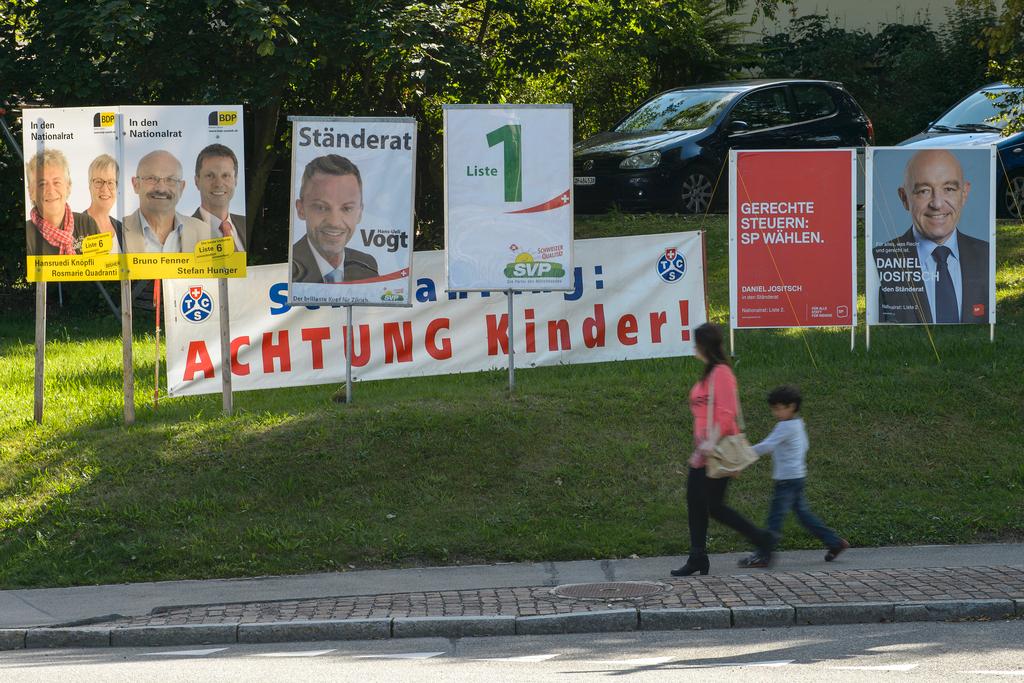Swiss politics: Less transparency, more spending on right

An attempt to peel back some of the secrecy that surrounds campaign spending in Switzerland indicates political parties on the right are the big spenders – with the least amount of transparency.
Ahead of the federal election in October, political parties were asked to respond to a survey by the Swiss Broadcasting Corporation (SBC), the parent company of swissinfo.ch. The results, published on Thursday, show that more than CHF20 million ($20.5 million) in spending was reported in the run up to the October 18 election, when voters will choose a new Swiss parliament for a statutory four-year term.
But that’s just a fraction of the total amount that parties and candidates are expected to spend during this campaign cycle. Experts say the 2015 election may turn out to be the most expensive in history, possibly costing as much as CHF170 million, which would be a third more than was spent in 2011.
It’s hard to put an exact figure on it, but the survey conducted by journalists with Swiss public television SRF and RTS tried to get an accurate picture. Nearly a quarter of the parties’ cantonal sections, particularly those on the right, refused to answer the survey. Of the amounts reported, the cantonal sections spent CHF13.4 million; their national counterparts laid out CHF7.6 million.
Swiss democracy
The Swiss have a proud tradition of direct democracy, claiming theirs is virtually the only country in the world where the electorate has such extensive decision-making powers. Though Switzerland is often held up as a model of democracy, it is the only country in Europe without campaign disclosure laws.
For that it is regularly criticised by the Organisation for Security and Co-operation in Europe (OSCE) and by the Council of Europe’s European Group of States against Corruption (GRECO), which monitored the last elections. Transparency International also issues warnings from time to time.
Almost 68% of the 193 respondents from cantonal sections filled out the survey, at least partially. Some 23% refused to provide any figures, while the remainder did not reply at all despite several reminders. There was no way to verify the accuracy of the information that was provided.
The political spectrum
The centre-left Social Democrats were the most transparent, according to the number of responses to the survey, in which it declared some CHF5.5 million in spending. The Greens also had a high response rate, and revealed just under CHF2 million in spending.
On the other side of the political spectrum, the centre-right Radicals were the least transparent, with just nine of the 25 cantonal sections responding, not enough information to provide an accurate spending picture. There was only slightly more transparency from 13 of the 26 cantonal sections of the Swiss People’s Party, the leading political party in terms of electoral strength.
Billboards and flyers with menacing pictures around the core themes of immigration and Swiss independence from the rest of Europe, many of them financed by the party’s strongman billionaire Christoph Blocher, have become a common sight during elections in recent years. Campaign materials are not allowed on broadcast media in Switzerland.
The language difference
Along with the left-right divide, the survey showed transparency divisions along the Röstigraben – the Rösti trench – a term frequently used in political discussion to describe the differences in mentality between German- and French-language regions, particularly when there are nationwide votes. Rösti is a dish of pan-fried grated potato that is particularly popular in the German-speaking part of the country.
Nearly 30% of German-speaking sections refused to disclose their spending. Only 6% of French-speaking parties wouldn’t answer the survey – but said they would provide information after the election.
Translated from French and German, edited and adapted by John Heilprin

In compliance with the JTI standards
More: SWI swissinfo.ch certified by the Journalism Trust Initiative











You can find an overview of ongoing debates with our journalists here . Please join us!
If you want to start a conversation about a topic raised in this article or want to report factual errors, email us at english@swissinfo.ch.